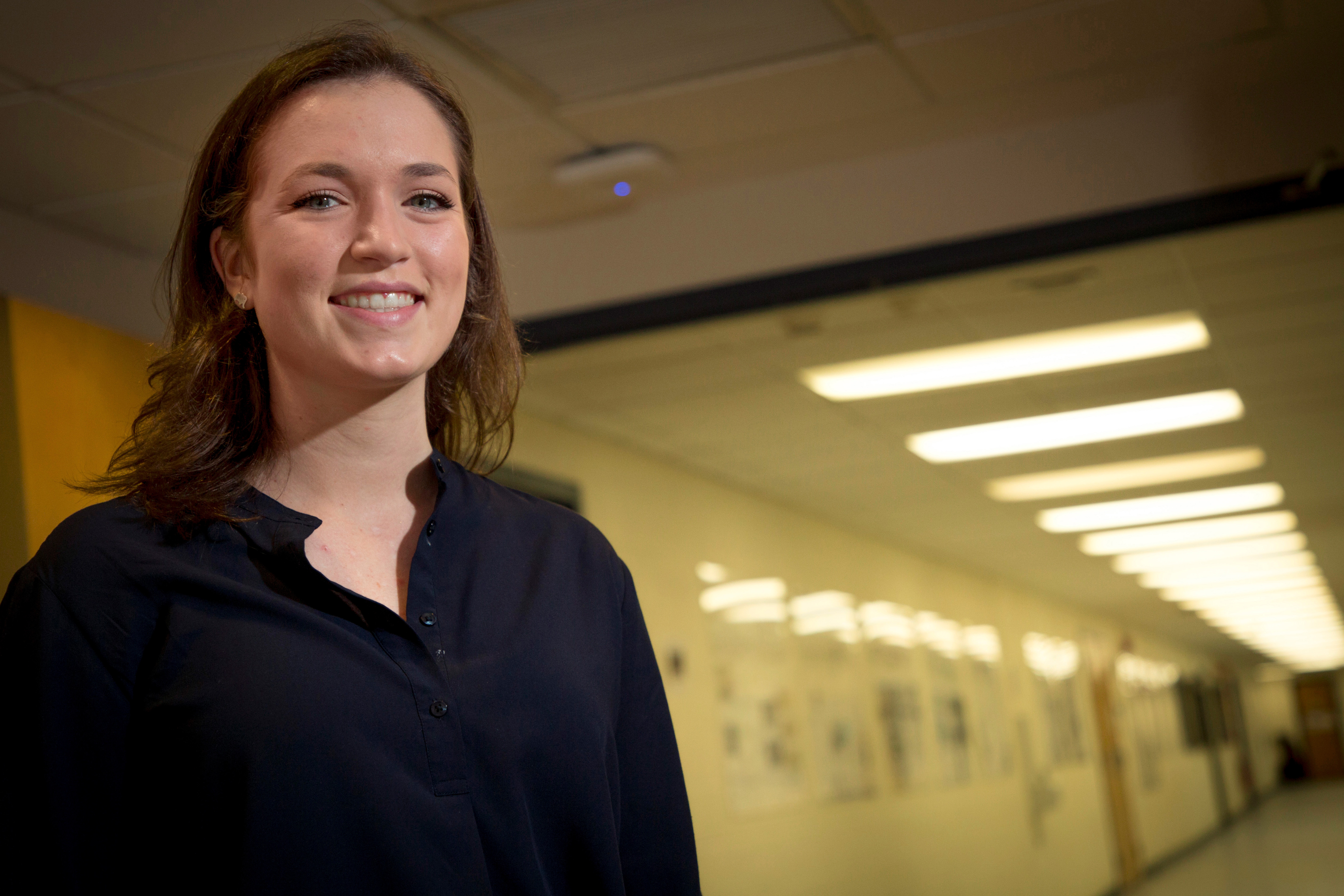During the eight months that UConn senior Lindsey Gilson ’17 (BUS, ENG) worked at Unilever, she led two projects that saved the company over $1 million and improved its inventory system.
Gilson, who is a Management and Engineering for Manufacturing (MEM) major, found that the company’s grocery inventory system had flaws that caused it to report product availability incorrectly.
“People would go to the shelves and say, ‘I really want this size of mayonnaise, but it’s not there,’” Gilson said. “They either didn’t buy it, or they bought a competitor’s mayonnaise.”

For her exceptional work with Unilever, Gilson was named UConn Co-op of the year for 2016 and Intern of the Year by the American Society for Engineering Education. (UConnEdit refers to her eight-month stint at Unilever as a Co-op, or Cooperative Educational Experience, while the American Society for Engineering Education defines her term as an internship.)
The popular MEM program has tripled enrollment in the past five years to 148 students. The program currently has 23 percent women students, much higher than the national average, said co-director Bob Day, who is also a professor in the Department of Operations and Information Management in the School of Business.
“Manufacturing is a hot career now,” Day said. “The partnership between business and engineering is particularly attractive to employers. Our students are filling a niche that the market needs, people who are savvy in both business and engineering; people who are able to lead the specialists of the world. UConn is proud to be creating leaders in this field.”
Gilson is excited about the career opportunities she will have.
“The business portion of my degree will give me an edge in the workplace, because I can see the cause-and-effect of engineering decisions on the entire business scale,” she said. “I think many people are ‘silo-ed’ in their degrees, but adding the business portion to my manufacturing degree allows me to see the entire picture. It boils down to this: everything is a business, therefore we must understand the business world.”
In January 2016, Gilson traveled to Minneapolis to start her work with Unilever, where she was in charge of managing the inventory of Unilever mayonnaise and tea to a large chain of retail stores.
In addition to her day-to-day responsibilities, such as preparing reports and data analysis, one of Gilson’s projects involved improving on-shelf availability. Once she was able to improve the system, she was excited to test the results, tracking products from store arrival through sales, and then verifying the accuracy of the system by going to the store and counting the inventory.
Her second major project involved refining a program created by an outside contractor that automatically manages orders for a large retailer, which was used by 4 percent of the company’s distribution centers. The program was supposed to sense when a new order was required and automatically order new stock, but that task wasn’t working well.
During a team meeting, managers discussed the issue. Afterward, Gilson decided to fix the problem herself.
“One Friday afternoon, I sat down at 3 p.m. and didn’t stand up for four hours. I built this Excel document which essentially replaced the contractor’s system,” she said. “No one really asked me to do that. We were on a call one day, and everyone was so upset [about the situation] that I just took it upon myself to fix it.”
Gilson’s program addressed a flaw in the contractor’s ordering algorithm, which was making the process inaccurate. After the switch, her system immediately began improving the ordering process, with a 9 percent increase in effectiveness. The ordering issues were fixed within two weeks. After that, the system she created was expanded, and used in 12 percent of the retail company’s distribution centers. It was eventually incorporated into the original program.
Catherine Hernlem, a customer supply chain manager with Unilever, praised Gilson’s maturity and leadership.
“Lindsey Gilson was by far the most exceptional Co-op that I have ever worked with at Unilever, truly an asset,” Hernlem said in a letter supporting her nomination as Intern of the Year.
As a result of her exceptional work, Gilson was offered a place in the Unilever Future Leaders Programme. The program offers recent graduates a three-year rotation in three different jobs throughout the supply chain of Unilever, to help them become better leaders within the company.
Gilson, who is vice president of the MEM Society, said that she was glad to be recognized for her hard work, but said there are other students who could excel in the same way, if given the chance.
“My one piece of advice for future MEM students is to come ready to learn and ready to work,” she said. “This is a demanding program, but with a great work ethic in MEM comes great reward. I attribute my success to the friends I have made among both students and professors through MEM.
“Throughout the past four years they have pushed me to grow and learn, to take on leadership roles and learn new skills,” she added. “It’s an exciting time to enter the work force, especially with a degree like MEM that is all about being efficient and optimizing success.”
Student @UConn saves Unilever $1 million during her 8-month internship with the company.



